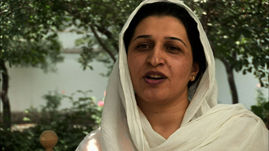Teachers' Domain - Digital Media for the Classroom and Professional Development
User: Preview


HASINA: When I go out of the house in the morning I say goodbye to my children and my family because I’m saying that I never know if I am coming alive back home or not.
NARRATION: 34-YEAR-OLD HASINA SAFI AND HER HUSBAND LIVE IN KABUL WITH THEIR THREE CHILDREN AND HIS EXTENDED FAMILY.
SOUND UP: “Mommy, Mommy!!”
NARRATION: SHE IS ONE OF MORE THAN 3,000 MEMBERS OF THE AFGHAN WOMEN’S NETWORK.
NARRATION: SAFI TRAVELS TO VILLAGES TO MONITOR THE PROGRAMS THAT SHE RUNS FOR ILLITERATE WOMEN.
HASINA: Who can tell me what you’ve been doing for the last eight months? What do you do every day?
NARRATION: WHEN THE TALIBAN WERE IN POWER, THESE CLASSES COULD NEVER HAVE BEEN HELD SO OPENLY.
HASINA: Do you just come here to complain to each other and look pretty?
WOMEN: – Why, no. We study.
HASINA: How is it useful for you to come here?
WOMAN IN PINK SCARF: – An illiterate person is like a blind person.
NARRATION: ALMOST 90% OF AFGHAN WOMEN DON’T KNOW HOW TO READ AND WRITE. SOME ARE JUST LEARNING THAT ISLAM ALLOWS THEM TO GET AN EDUCATION.
HASINA: Islam gives you the right to go to school. Islam gives you the right to go to the doctor. Islam gives you the right to study.
NARRATION: THIS CRUCIAL FIRST STEP WILL HELP AFGHAN WOMEN PLAY A ROLE IN SHAPING THE FUTURE OF THEIR COUNTRY.
HASINA: As Afghans, it is our responsibility to improve our country. What can we give to this nation? What can I do for my country as an Afghan woman?
NARRATION: BUT AFGHAN WOMEN WHO WANT TO CHANGE THEIR COUNTRY PUT THEIR LIVES AT RISK.
HASINA: We get threats, especially in the provinces where there are not very secure areas.
NARRATION: THE TALIBAN AT THE BEGINNING OF 2010 ARE STRONGER THAN AT ANY POINT SINCE U.S.-LED FORCES DROVE THEM FROM POWER IN 2001. WORKING WOMEN LIKE SAFI HAVE BEEN WAKING UP TO FIND TERRIFYING LETTERS POSTED ON THEIR DOORS DURING THE NIGHT.
NIGHT LETTER: We warn you to leave your job as a teacher otherwise we will cut the heads off your children and we shall set fire to your daughter.
NIGHT LETTER: This will be a good lesson for those women like you who are working. The money you receive is 'haraam,' forbidden under Islam, and coming from the infidels. The choice is now with you.
NARRATION: THE LIVES OF WOMEN HAVE IMPROVED SINCE THE TALIBAN WERE TOPPLED IN 2001. IN MANY PLACES, WOMEN CAN SAFELY APPEAR IN PUBLIC WITHOUT A BURQA. GIRLS ARE GOING TO SCHOOL. WOMEN ARE WORKING. MORE OF THEM HAVE ACCESS TO HEALTH CARE. AND AFGHANISTAN’S 2004 CONSTITUTION GUARANTEES WOMEN THE RIGHT TO VOTE – AND THE RIGHT TO 25 PERCENT OF THE SEATS IN PARLIAMENT.
NARRATION: BUT THERE ARE PLENTY OF PLACES IN AFGHANISTAN WHERE PROGRESS FOR WOMEN REMAINS ELUSIVE AND NOWHERE MORE SO THAN IN THE BIRTHPLACE OF THE TALIBAN – KANDAHAR.
NARRATION: HOME TO NEARLY A MILLION PEOPLE, KANDAHAR IS KEY TO THE U.S. MILITARY STRATEGY. IN THE SPRING OF 2010, 30,000 NEW TROOPS ARE HEADING TO AFGHANISTAN INTENT ON FORCING THE TALIBAN TO THE NEGOTIATING TABLE. BUT THE PROBLEM HERE IS NOT THE TALIBAN ALONE. CORRUPTION IS RAMPANT AND LEGIONS OF ARMED MEN PLAGUE ORDINARY CITIZENS AND UNDERMINE THE RULE OF LAW.
NARRATION: PROMINENT WORKING WOMEN ARE BEING ASSASSINATED. NO ONE KNOWS WHO IS DOING THE KILLING.
NARRATION: IN KANDAHAR FEW WOMEN DARE VENTURE OUT INTO THE STREETS. THOSE WHO DO, ARE PROTECTED ONLY BY THE BURQA.
SHAHIDA: Women go out with great fear and trepidation. Will there be a suicide attack? Will American tanks or NATO forces open fire on people?
NARRATION: ONE OF THE FEW OUTSPOKEN WOMEN’S RIGHTS ADVOCATES IN KANDAHAR IS SHAHIDA HUSSEIN. A FORMER MIDWIFE WHO MARRIED AT 14, HUSSEIN LIVES WITH HER HUSBAND OF 40 YEARS. THEY HAVE 8 CHILDREN AND 13 GRANDCHILDREN.
SHAHIDA: Women come here all the time and tell me their problems, whether it’s a legal problem or a property problem. Then I meet with the head of the court, I go with them to meet one of the judges, sometimes I meet with the head of the provincial council.
NARRATION: HUSSEIN INVITES A FEW LOCAL WOMEN TO TELL US ABOUT THEIR LIVES. THEY AGREE TO BE FILMED ONLY IF WE HIDE THEIR IDENTITY.
WOMAN IN GRAY BURKA: When I go out I’m terrified. We are powerless. What kind of government is this?
WOMAN IN FLOWERY DRESS: For five years, I’ve been trying to reclaim my father’s shop, and neither God nor the government is listening to me. I’ve been running around and they just demand money from me.
SHAHIDA: Administrative corruption is a real problem.
WOMAN BLACK FLOWERY DRESS: If this case had taken place under the Taliban they would have solved it right away. They didn’t want money, the Taliban.
WOMAN IN GRAY BURKA: They say there is security in Kandahar but where is it? Women can’t even go out. Who knows who is shooting, whether it’s the Taliban, the government or someone else?
SHARIFA: Neither the Americans nor the government rule here. The Americans are on one street and the Taliban on another. They can see each other!
SHAHIDA: It’s not that these women were so content under the Taliban, but now when they think about it, at least the security situation was good.
 Loading Standards
Loading Standards